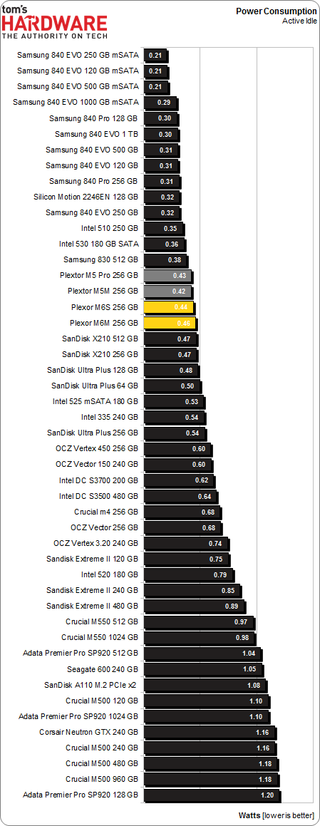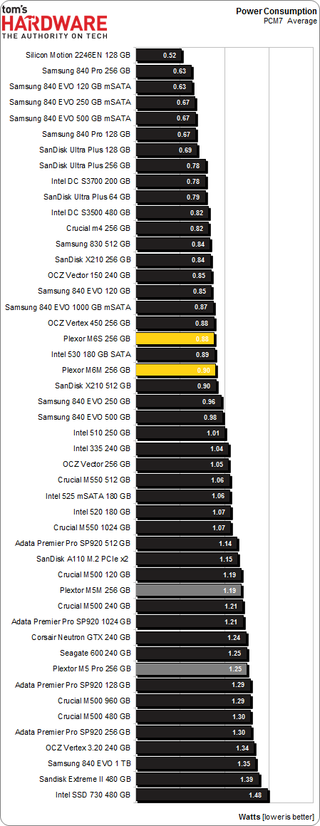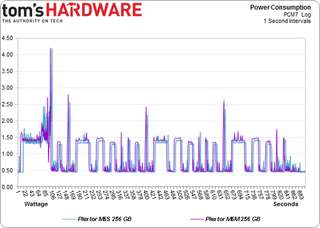Plextor M6S And M6M SSD Review: Revving Another Marvell Engine
Plextor is launching two new SSDs under its M6 banner. The M6S and M6M lean on Toshiba's A19 flash and Marvell's updated 9188 silicon. Together, both components (plus some custom firmware work) should augment value and speed in a couple of form factors.
Results: Power Consumption
Active Idle Power Consumption
Idle consumption is the most important power metric for consumer and client SSDs. After all, solid-state drives complete host commands quickly and then drop back down to idle. Aside from the occasional background garbage collection, a modern SSD spends most of its life doing very little. Enterprise-oriented drives are more frequently used at full tilt, making their idle power numbers less relevant. But this just isn't the case on the desktop, where the demands of client and consumer computing leave most SSDs sitting on their hands for long stretches of time.
Active idle power numbers are critical, especially when it comes to their impact on mobile platforms. Idle means different things on different systems, though. Pretty much every drive we're testing is capable of one or more low-power states, up to and including DevSlp. That last feature is a part of the SATA 3.2 host specification. And while it requires a capable SSD and a compatible platform, enabling DevSlp takes power consumption down to a very small number.

Given the ultra-low power enabled by DevSlp, I'd like even greater precision from our power measurements. Still, at active idle, the M5 and M6 drives demonstrate similar consumption.
PCMark 7 Average Power Consumption
If we log power consumption through a workload, even a relatively heavy one, we see that average use is still pretty close to the idle numbers. Maximum power may spike fiercely, but the draw during a PCMark 7 run is light. You can see the drives fall back down to the idle "floor" between peaks of varying intensity.

New flash and an updated controller pay off; the M6 outdoes Plextor's previous generation in our average power consumption test.
Stay on the Cutting Edge
Join the experts who read Tom's Hardware for the inside track on enthusiast PC tech news — and have for over 25 years. We'll send breaking news and in-depth reviews of CPUs, GPUs, AI, maker hardware and more straight to your inbox.

Despite the fact that the M6M is powered by the +3.3 V rail and the M6S uses +5 V, the two drives demonstrate near-identical readings.
Active idle kicks around the mid .4 W range, though on a Haswell-U-based system, DevSlp would drop that figure to .002 W or so, according to Plextor. The caveat is that it takes a significant amount of time to recover from this state.
Current page: Results: Power Consumption
Prev Page Storage Consistency: The Adobe Photoshop (Heavy) Trace Next Page Plextor Iterates Its Line-Up With New Components-
bjaminnyc I know there are slight performance differences between models and manufacturers, for the home user the discrepancies matter very little other than lifespan. It all comes down to price point for non-commercial application, not sure where this really fits in the product stack.Reply -
WithoutWeakness The Marvell 88SS9188 controller in the M6S is only capable of addressing 4 NAND channels at a time whereas the 88SS9187 (Crucial M500, Plextor M5Pro) and 88SS9189 (Crucial M550) are capable of addressing a full 8 channels. I would expect the Plextor M6Pro to use the newer 88SS9189 found in the M550 to be able to address 8 channels of NAND and support up to 1TB drives using 128Gbit NAND.Reply -
Ipatinga Clean looks... ok update for the M5S... here hopping M6P will have something on its sleeve performance wise. I liked the Plextor software (its like a bonus for some people... ).Reply
But I still have the Samsung 840 EVO on my list, after all, when the dust settles, they both perform very well in a notebook for a regular joe, but the EVO has the price to beat.
Since my Crucial m4 is not dead... I will wait... mainly for prices to go even lower so I can get a higher capacity model instead of the best of the best. -
cryan Reply13069953 said:The Marvell 88SS9188 controller in the M6S is only capable of addressing 4 NAND channels at a time whereas the 88SS9187 (Crucial M500, Plextor M5Pro) and 88SS9189 (Crucial M550) are capable of addressing a full 8 channels. I would expect the Plextor M6Pro to use the newer 88SS9189 found in the M550 to be able to address 8 channels of NAND and support up to 1TB drives using 128Gbit NAND.
So we weren't able to get confirmation from Plextor or Marvell, but it's probably the case that the 9188 is a cut down four channel version of the 9189. It's all the more annoying, because this is the third review in a row with new Marvell silicon but no actual info from Marvell.
We have a pretty good idea of this from looking at the 9174 4 channel used in the UltraPlus vs the 8 channel 9175 used in.... pretty much everything else ever made... that the 9188 is a four channel version of the 9189. But we don't know how many CEs per channel it has, or much else for that matter.
However, we do know Plextor's M6 Pro will have a 1 TB version, also with A19 flash. Plextor reps told me as much at the 2013 Flash Memory Summit. That was last August though, so I think there have been some delays -- either with Marvell, Toshiba, or both.
Regards,
Christopher Ryan -
cryan Reply13071551 said:Why not compare the Samsung EVO 840?
If you're referring to the 128 KB sequential and 4 KB random performance, I'm trying to keep those clean. I'd much rather throw down on matchups like this in more important metrics. However, with TRIM testing out this go around, the EVO v. M6 angle got downplayed. It's an oversight.
Regards,
Christopher Ryan
-
cryan Reply13073455 said:I really wish write speeds would actually make a jump.
For sequential writes, you can't do much better than 500 MB/s. The fastest M6M/M6S hits 440 MB/s, and so there just isn't much room left to grow unless you switch to PCIe-based storage or add a couple drives in RAID.
Regards,
Christopher Ryan
-
michaelrhaley Great article! I'd like to see a summary comparison of your top ten drives listed in Tom's best SSDs for the money using your new benchmark. Most important is your omission of Samsung 256G Pro which has been your leader for 8 months cited now as "face meltingly fast". Any performance benchmark must include the Samsung leader. Love to see this right away from you!Reply
Sincerely, Michael -
kalmquist Currently, the 128GB M6S is selling for $100 on Newegg, the 256GB M6S is selling for $165. The 512GB M6S is not listed.Reply
Hard to justify buying these over the Samsung 840 EVO ($85 and $154). Actually, for most uses my first thought would be the Crucial M500 ($75 and $120). The M500 doesn't win on either performance or power consumption, but it is good enough that these will not be major issues for the typical user.
Most Popular


